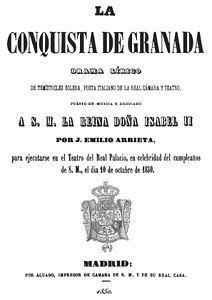La conquista di Granata
| Work data | |
|---|---|
| Title: | The conquest of Granada |
| Original title: | La conquista di Granata |

Spanish title page of the world premiere libretto |
|
| Original language: | Italian |
| Music: | Emilio Arrieta |
| Libretto : | Temistocle Solera |
| Premiere: | October 10, 1850 |
| Place of premiere: | Madrid , Teatro de Real Palacio |
| Place and time of the action: | Granada 1492 |
| people | |
La conquista di Granata (German: Die Eroberung von Granada , Spanish: La conquista de Granada ) is an opera by Emilio Arrieta . The libretto is from Temistocle Solera . The first performance took place on October 10, 1850 in the Teatro de Real Palacio in Madrid . Musically, the opera is “a magnificent piece of bel canto ” with numerous choir scenes.
action
The action takes place before and in Granada in 1492: In the course of the Reconquista, the Spanish army besieged the city and its fortress, the Alhambra .
first act
First picture
The Spaniards have set up an army camp in front of Granada. The Spanish Queen Isabella I baptizes it with the name "Santa Fé" (Holy Faith). She wants to conquer the Alhambra and from there rule over a Roman Catholic Spain. Gonzalo of Córdoba, leading knight in Isabella's suite, is in love with Zulema. Zulema is the Christian [!] Daughter of Muley-Hassem, sister of Boabdil , King of Granada, and of Almanzor, the leading warrior of the Nasrids . Almanzor challenges the strongest warrior in the Spanish army to a duel . Isabella names Gonzalo for this, but who has sworn to Zulema not to fight anyone from her family. But his friend, Lara, offers to carry out the duel in his place, wearing Gonzalo's armor .
Second picture
In the Alhambra, Zulema anxiously awaits the outcome of the battle. Almanzor is killed, whereupon Muley-Hassem curses his daughter.
Second act
First picture
Zulema is now to be married to the Moorish prince Alamar and is decorated for it. Gonzalo can sneak into the Alhambra undetected and tell Zulema that Lara was not the opponent of the duel in which Almanzor was killed. Zulema and Gonzalo ensure their love for each other.
Second picture
Almanzor is remembered in a funeral procession. Gonzalo has now been captured and is to be executed at Almanzor's tomb. Lara steps in and confesses that he was the opponent in a duel with Almanzor. Muley-Hassem then pardons them both, which triggers the indignation of the Moorish warriors.
Third act
Queen Isabella announces that she will support Christopher Columbus on his expedition across the Atlantic to India, even against the skepticism of her Privy Council, and already sees herself as the mistress of two worlds. She now wants to give the order to storm Granada. Gonzalo asks them, out of consideration for Zulema, to refrain from conquering. Isabella gives in. But then the news arrives that Muley-Hassem and Zulema have been imprisoned by the Moors. Gonzalo then immediately changes his mind and wants to continue the war against the Moors. Queen Isabella also agrees.
Hostile groups of the Moors meet at King Boabdil's and want to fight together for the fatherland.
Muley-Hassem dreams in prison of his deceased wife, Zulema's mother, who leads him into an apparition of Mary . He professes Christianity. Gonzalo frees the two of them from prison. The Moors hand over the city to the Spaniards and Queen Isabella can now move into the Alhambra, an occasion for a grand finale .
Historical context
The opera was commissioned by the Spanish Queen Isabella II , who had appointed the composer, Emilio Arrieta, as director of her court opera and also otherwise promoted it. The plot of the opera is therefore propaganda for and homage to Isabella II, which was reflected in Queen Isabella I in the opera. This is particularly evident in the scene, which is completely unconnected with the rest of the plot, in which Isabella I announces her support for Columbus and in the complete omission of Queen Isabella I's husband, King Ferdinand II. In the plot.
The content of the libretto is no longer justifiable by today's standards of political correctness : All Muslims are the bad guys and the underdogs. As far as Moors are among the good guys in the plot, they are or will be Christians (Zulema, Muley-Hassem). Statements in the libretto about Islam are defamatory. The statements about Christianity are based on the contemporary Spanish, Roman Catholic version, the libretto is generally permeated with colonialism . All of this makes it very difficult to perform the opera today.
After its first performance in 1850, it was only performed a little more than a dozen times, after the original version again under the title Isabel la Católica at the Teatro Real and then forgotten. It was not until 2006 that there were two more concert performances in Madrid. In 2014 the opera was staged again in the Stadttheater Gießen - for the first time outside of Spain.
literature
- Libretto (Italian / Spanish), Madrid 1850. Digitized at Google Books
- Hans-Jürgen Linke: Most humble thanks. Belcanto gem: the Stadttheater Gießen discovers Emilio Arrieta's opera “The Conquest of Granada” In: Frankfurter Rundschau v. 28/29 May 2014, p. 36.
- Christian Schröder: Musical "Alhambrismo" In: Stadttheater Gießen (Ed.): The Conquest of Granada (DE). La Conquista the Granata. Opera by Emilio Arrieta = program booklet . Giessen 2014, pp. 7–9.